
Milk is a staple in many diets that provides essential nutrients like calcium, protein, and vitamins. However, the way our bodies digest milk can vary depending on the type of milk and lactose intolerance level. If you’re wondering how long does it take to digest milk, knowing the typical digestion time helps you better manage your nutrition and overall health.
Milktab is a go-to solution for making your dairy consumption easy, no matter how long it takes for your body to process it. Our powerful dairy relief pills contain triple the amount of lactase enzyme, which breaks down the lactose faster and gives you smoother digestion. Whether it's a latte or a bowl of cereal, Milktab lets you enjoy dairy without digestive discomfort.
With our extensive research on lactose intolerance, we will share valuable insights into how long does it take to digest milk. Throughout this guide, you will learn the stages, factors, and average time for digestion. In the end, you will understand better how your body digests milk and how to improve your digestive experience.
Let’s dive in!
How Long Does It Take To Digest Milk: The Stages of Milk Digestion
Milk digestion is a multi-step process that occurs throughout the digestive system. Understanding how long does it take to digest milk requires exploring each stage of digestion. These stages reveal how the body breaks down milk and absorbs essential nutrients. Let's explore the different stages in detail.
Milk Digestion In the Stomach
The digestion of milk begins in the stomach shortly after consumption. When milk enters, it mixes with stomach acids and digestive enzymes. These substances are critical for breaking down the milk’s proteins and fats.
This process usually lasts around 2-4 hours, after which the partially digested milk moves into the small intestine for further digestion and nutrient absorption. Here's how the stomach acids and pepsin enzyme work to break down milk:

- Protein Breakdown: Stomach acids dissolve the proteins in milk, making them easier for digestive enzymes to break down. This starts digesting proteins.
- Pepsin’s Role: The Pepsin enzyme breaks down the proteins into smaller pieces called peptides, making it easier for your body to absorb them later.
- Fat Separation: The fat in milk separates into smaller droplets. These droplets will be further processed in the small intestine for absorption.
- Lactose Processing: Lactose, the sugar in milk, is not digested in the stomach. It moves on to the small intestine, where it is processed.
- Chyme Formation: As the milk mixes with stomach acids and enzymes, it turns into a semi-liquid mixture known as chyme. This mixture then travels to the small intestine for continued digestion and nutrient absorption.
The Role of Lactase and Lactose Digestion In the Small Intestine
Once the partially digested milk moves to the small intestine, lactose (the sugar in milk) digestion begins. The small intestine produces an enzyme called lactase, which is crucial for breaking down lactose. Lactose must be broken into two smaller sugars—glucose and galactose—for better absorption.
This process allows the body to use the energy from lactose. For those who are lactose tolerant, here’s how the process works:
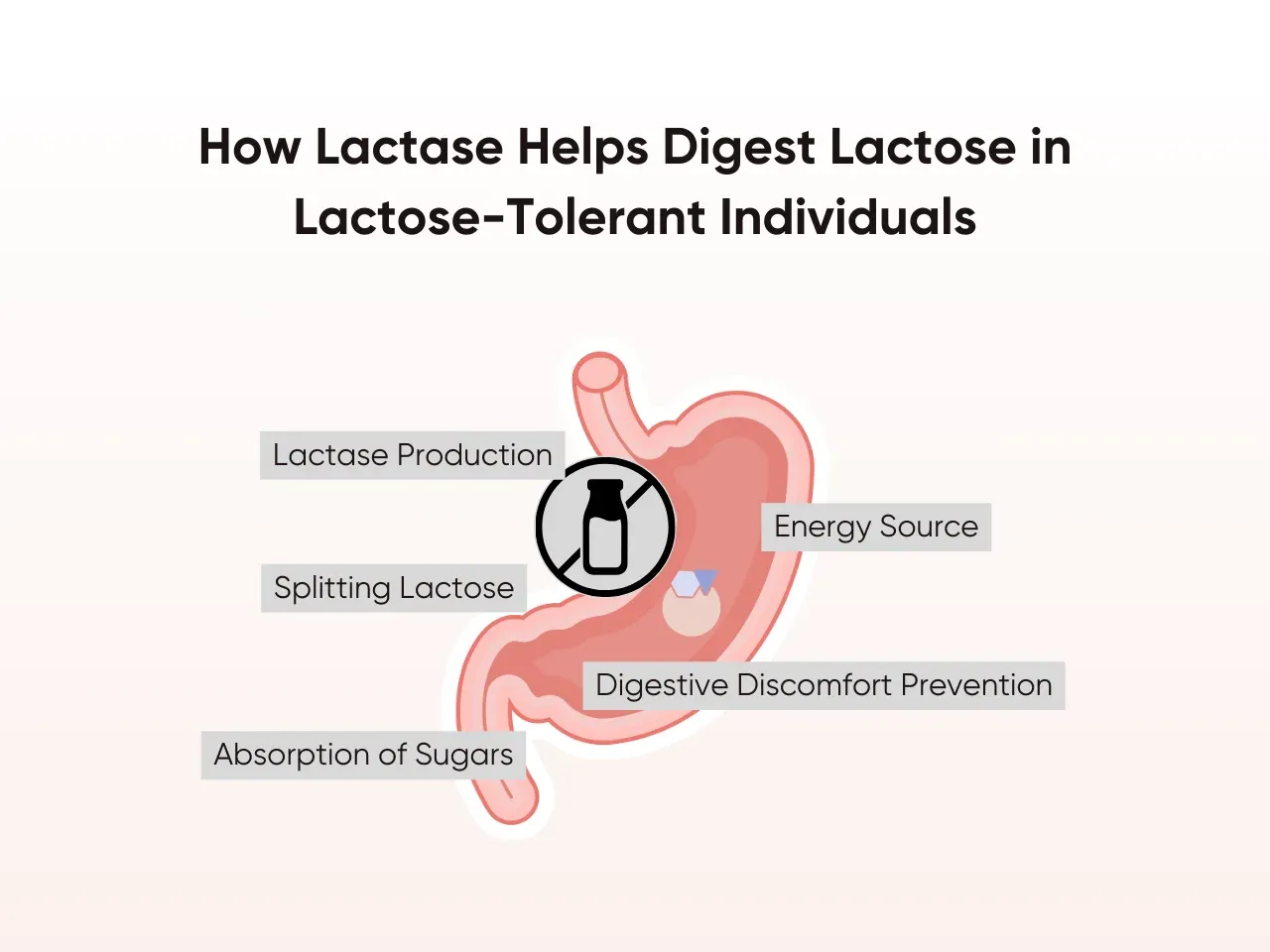
- Lactase Production: When lactose is present, the small intestine produces lactase. This enzyme explicitly targets lactose and prepares it for digestion.
- Splitting Lactose: Lactase splits lactose into two smaller sugars, glucose and galactose, which affects how long does it take to digest milk and makes it easier to absorb from the body.
- Absorption of Sugars: Once broken down, glucose and galactose are absorbed through the walls of the small intestine, where they move to the bloodstream and provide energy to the body.
- Energy Source: The glucose and galactose are transported into cells, where they are used as energy sources. This is why milk can be an efficient energy provider.
- Digestive Discomfort Prevention: For lactase-sufficient individuals, breaking down lactose prevents digestive discomfort, such as gas or bloating.
Absorption and Nutrient Extraction
Once milk is broken down in the small intestine, its nutrients are ready for absorption. This is where the body extracts essential nutrients that support bone health, muscle repair, and overall body functions. The small intestine absorbs these nutrients and sends them into the bloodstream for distribution. It can be done through the following ways:
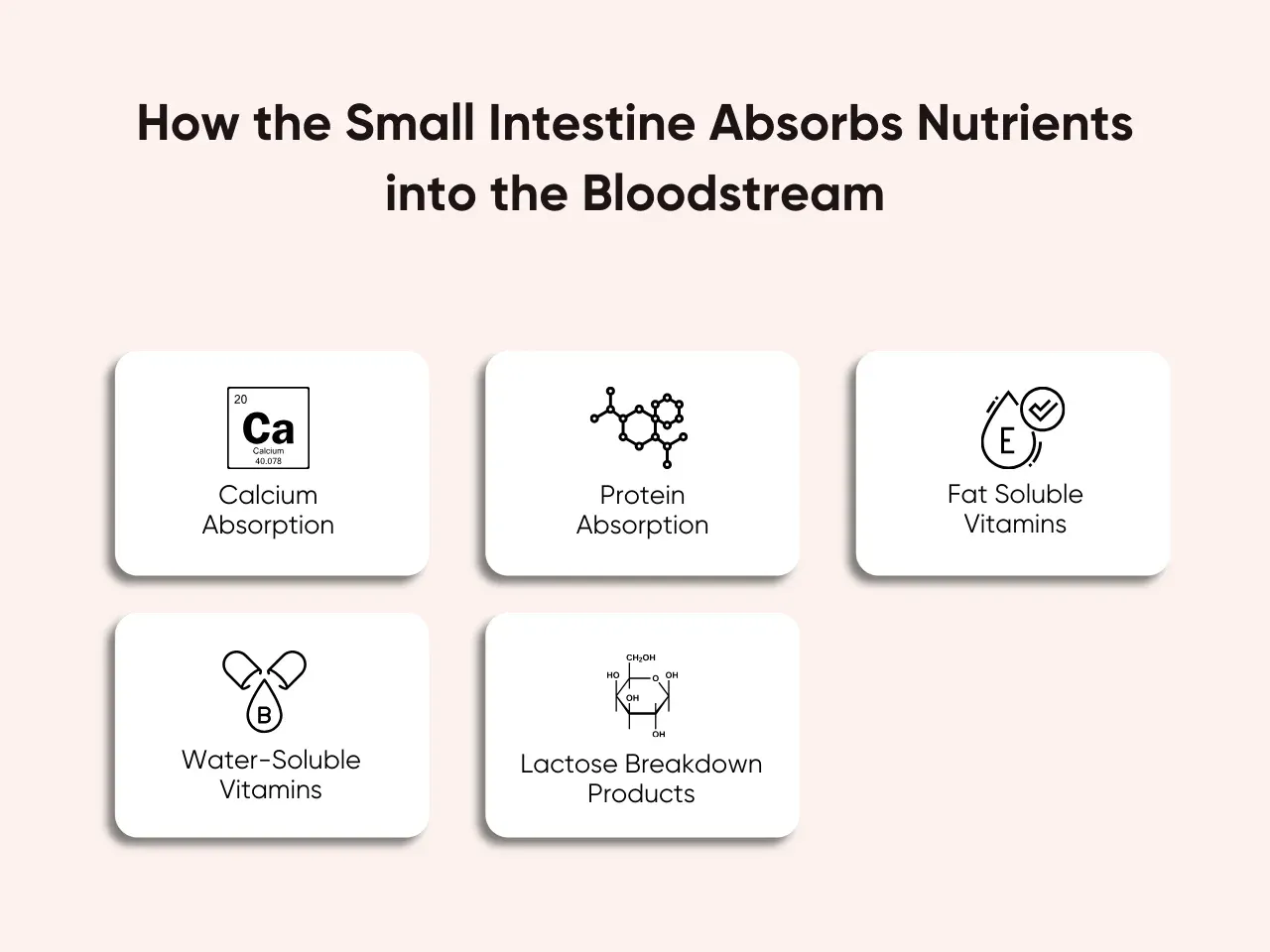
- Calcium Absorption: Calcium is absorbed through the walls of the small intestine and sent into the bloodstream, which aids in stronger bones and teeth.
- Protein Absorption: Milk proteins are broken down into amino acids, which are absorbed into the bloodstream. These amino acids are used for muscle repair and tissue growth.
- Fat-Soluble Vitamins: Vitamins like A, D, and E dissolve in fats and are absorbed along with fat molecules. These vitamins benefit vision, immunity, and cell functioning.
- Water-Soluble Vitamins: Vitamins like B and C dissolve in water and are absorbed directly into the bloodstream. This is crucial for producing energy and boosting your immune functions.
- Lactose Breakdown Products: The glucose and galactose from lactose are absorbed and used as energy. These sugars serve as fuel for cells and various bodily functions.
Factors That Affect How Long Milk Takes To Digest
Several factors can influence how long does it take to digest milk. Among these, metabolic rates and the type of milk consumed have the most significant influence. Below is a closer review of the elements that impact milk digestion time.
Lactose Intolerance and Its Impact on Digestion
Digestive issues like lactose malabsorption affect how long does it take to digest milk. People with this health condition have low lactase levels, making it difficult for digestion. As a result, lactose passes through the digestive system without being properly broken down.
To diagnose lactose intolerance, conduct a lactose tolerance test and the hydrogen breath test to measure the hydrogen present in your breath. A stool acidity test can also detect unprocessed lactose in the stool. Once diagnosed, lactose intolerance causes uncomfortable symptoms and a hard time with slow digestion as it does the following:
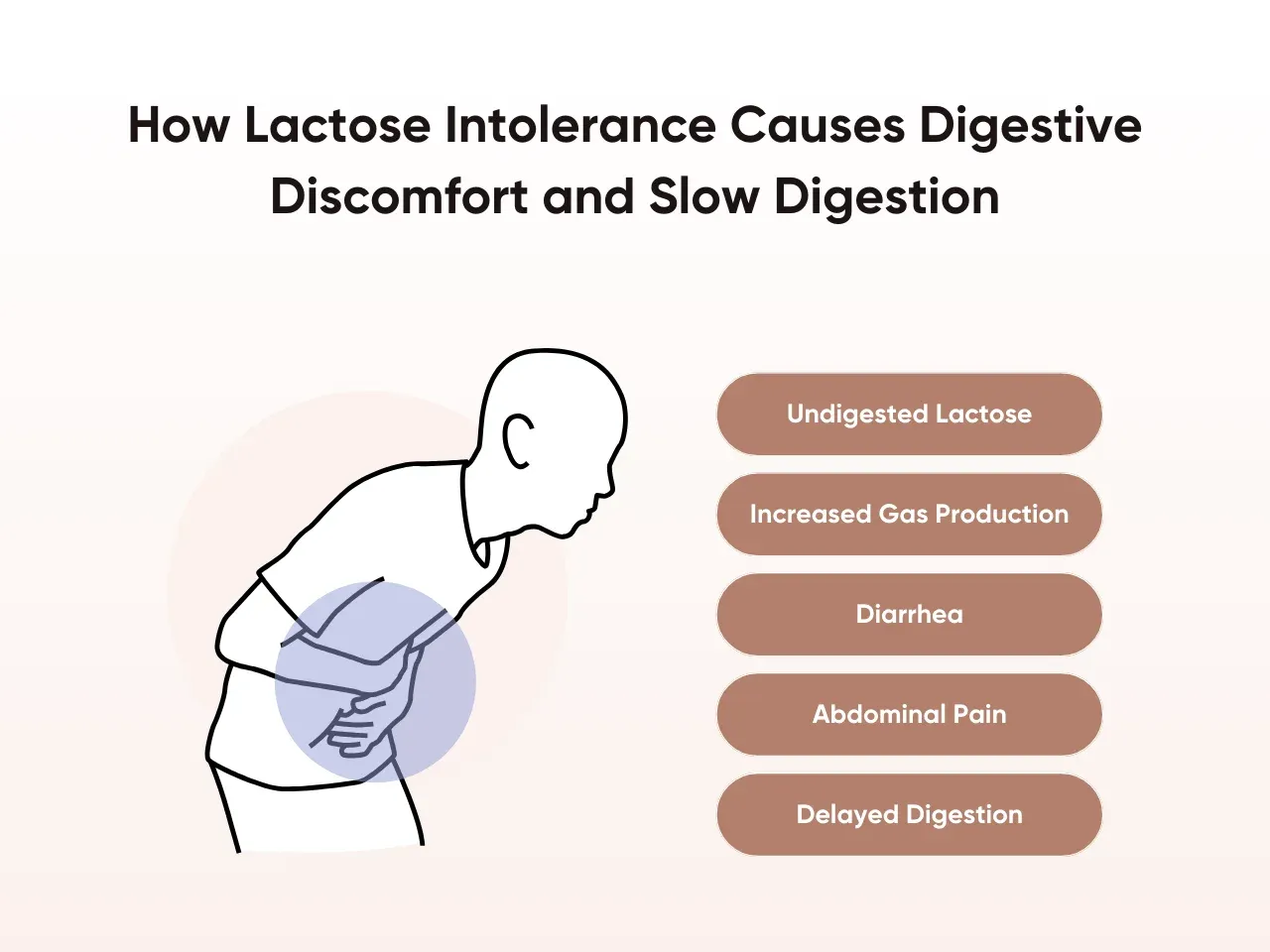
- Undigested Lactose: Lactose stays in the digestive system without being broken down, a common cause of lactose intolerance. This can lead to fermentation by gut bacteria, causing gas, nausea, and bloating.
- Increased Gas Production: When bacteria in the gut ferment lactose, they produce excess gas, which causes discomfort, bloating, and sometimes cramping, although some may experience milder symptoms.
- Diarrhea: The body cannot effectively absorb undigested lactose, and it pulls water into the intestines, often leading to diarrhea.
- Abdominal Pain: It causes a buildup of gas and undigested lactose, which develops abdominal pain. The symptoms most often occur after dairy products are consumed.
- Delayed Digestion: The time that milk takes to pass through the system is much longer, affecting how long does it take to digest milk. This delays nutrient absorption, which may lead to more distress.
Note that there are two main types of dairy sensitivity: primary and secondary lactose intolerance. Primary lactose intolerance usually develops in adulthood due to the body’s inability to produce enough lactase. Secondary lactose intolerance is often caused by conditions like celiac disease, which damage the intestines and impair lactase production.
Type of Milk Consumed (Whole, Skim, Plant-Based)
The type of milk you consume also affects how long does it take to digest milk. Different types of milk have unique compositions of fat, protein, and other nutrients, which influence digestion time. Let's compare the digestion times between the three most common types of milk:
Whole Milk
Whole milk digests slowly due to its higher fat content, which impacts how long it takes to digest milk. The creamier the milk is, the longer it keeps you feeling full. Although it takes the digestive system a little longer to process, the fat in whole milk, like cow’s milk, facilitates the absorption of fat-soluble nutrients. Here are the types of whole milk to check out:
- Organic Whole Milk
- Vitamin D Whole Milk
- Flavored Whole Milk
- Coconut Whole Milk
- A2 Whole Milk
Skim Milk
Skim milk is low in fat or completely fat-free. This makes it faster to digest compared to whole milk, contributing to how long does it take to digest milk. Such a digestion rate makes it a popular choice for low-calorie beverages. Since it doesn't contain fat, skim milk may not be as satisfying as whole milk. However, it is the best option for those looking to lessen their calorie intake while still enjoying dairy. Skim milk typically includes:
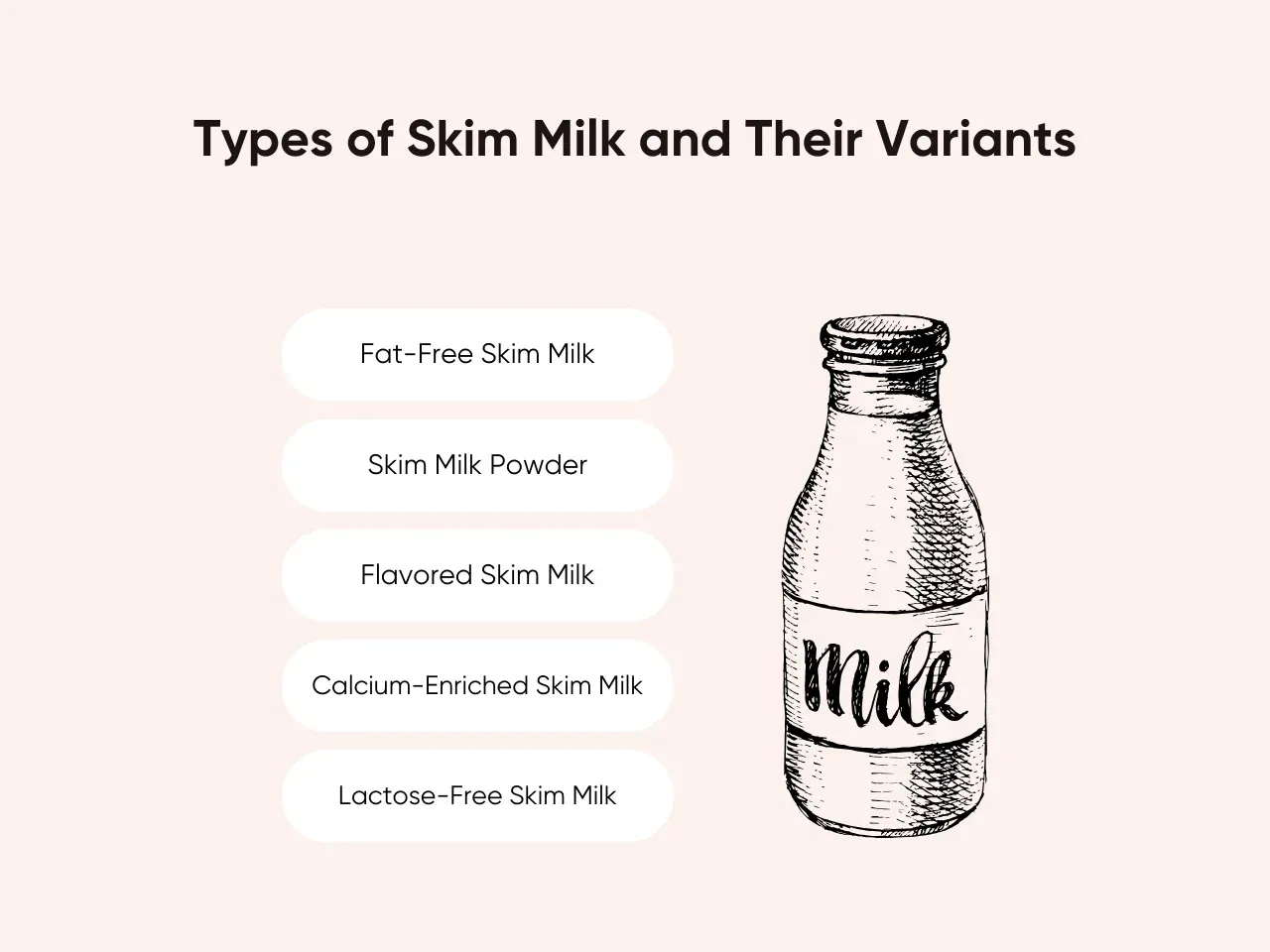
- Fat-Free Skim Milk
- Skim Milk Powder
- Flavored Skim Milk
- Calcium-Enriched Skim Milk
- Lactose-Free Skim Milk
Plant-Based Milk
Plant-based milk digests faster than both whole and skim milk due to its lower fat content and often lighter composition. Often fortified with nutrients, they influence how long does it take to digest milk, making them great alternatives for those with lactose intolerance or anyone choosing to avoid dairy. Certain varieties, like plant-based milk, may even contain added fiber that helps boost digestion. Some common plant-based milk options are:
- Almond Milk
- Soy Milk
- Oat Milk
- Coconut Milk
- Rice Milk
Individual Metabolism and Digestive Health
People's metabolisms vary widely, and they also affect how long it takes each individual to digest milk. These can include the individual's metabolism, gut health, and, of course, the age itself. Quick digestion of milk may occur when an individual has the fastest metabolism.
At the same time, some digestive issues slow digestion and can cause potential discomfort when drinking milk. Age also plays a role—digestive efficiency generally declines with age, making milk digestion slower for older adults.
Average Time To Digest Milk
On average, it typically takes about 1.5 to 3 hours to digest milk. This all depends on the person's metabolism and how healthy one's gut is.
As long as those factors are present in the body, generally, milk should be digested within this given timeframe. That means most people's digestive responses to it would be within a few hours after taking in the milk.
Digestion and Dietary Considerations
Milk is a nutrient-dense food, especially for patients with digestive disorders. Individuals' ability to digest milk varies greatly, affecting their diet. For others, adding milk to diets is essential to getting calcium and protein.
However, some individuals may experience poor milk digestion, which causes pain and discomfort due to digestive disorders. It's important to consider how milk fits into individual dietary preferences and overall health goals. Understanding how milk is being digested within the body helps make proper nutritional choices.
Strategies to Improve Milk Digestion
Improving milk digestion can enhance overall well-being and the absorption of nutrients. Small adjustments in how you consume milk can ease the digestive process. Taking your food slowly can also influence how long it takes to digest milk.
Explore more of these suggestions to improve your milk digestion better:
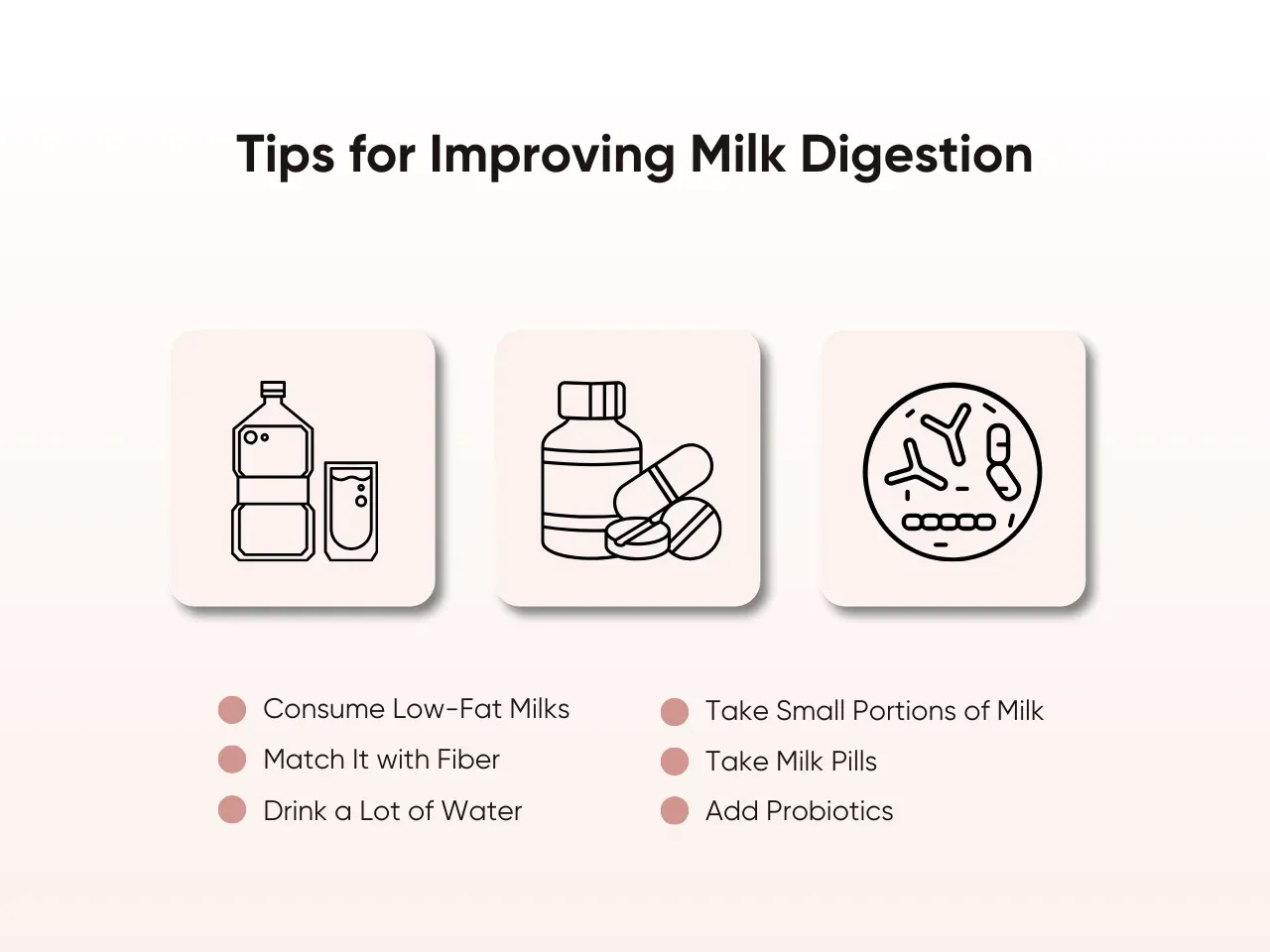
- Consume Low-Fat Milks: For some people, low-fat or skim milk would yield easier digestion. The lack of fat content makes digestion quicker, affecting how long does it take to digest milk.
- Match It with Fiber: Milk with fibrous food, such as fruits or whole grains, can help digestion. Fiber will ensure that food passes through the digestive tract with ease.
- Drink a Lot of Water: Adequate daily water intake will enable proper digestion. Hydration allows for easy digestion, as water breaks down food well, and there will be little chance of constipation.
- Take Small Portions of Milk: Small amounts of dairy might minimize discomfort. It will give the body enough time to digest milk without being overwhelmed.
- Take Milk Pills: Milk pills are specially formulated to support digestion by providing the lactase enzyme needed to break down lactose effectively. They can be particularly helpful for those with lactose or food intolerance.
- Add Probiotics: Although probiotics are used in food products like yogurt to help improve intestinal health, they can also improve milk digestion.
Milk Alternatives for Easier Digestion
For those who struggle to digest milk, several alternatives can help impact the time it takes to digest milk. Lactose-free milk is an excellent option for individuals who experience lactose intolerance symptoms, as it contains the same nutrients without causing discomfort. Plant-based milk, such as almond, soy, and oat milk, can also be easier to digest.
These dairy alternatives are fortified with added vitamins and minerals to match the nutritional benefits of dairy milk. Furthermore, some plant-based options contain fiber that can aid in digestive health. Exploring these alternatives helps you achieve a balanced diet with fewer digestive problems.
Key Takeaway
Understanding how long does it take to digest milk can help you make more informed dietary choices. Milk digestion varies from person to person and is influenced by factors like metabolism, age, and the type of milk consumed. By being aware of these factors, you can better manage your dairy consumption and overall digestive health.
Knowing the stages and timeline can also be helpful if you experience rapid digestion or find milk products harder to process. If you deal with this issue, small dietary adjustments can make a difference. Pay attention to your body’s reactions to improve your digestion better.
Looking for ways to relieve the symptoms of lactose intolerance? Milktab offers the best lactose intolerance pills designed to support smooth and comfortable digestion. Try Milktab today and enjoy your favorite dairy foods without the discomfort. For more information or questions, contact us at contact@milktab.co today.